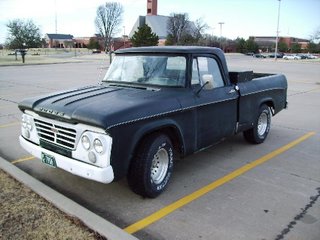| Subject: |
|
Re: Article by Steve Wall, on DOT's....... |
| Name: |
|
JimmieD |
| Date Posted: |
|
Mar 16, 06 - 10:33 PM |
| Dodge-Link |
|
http://www.moparaction.com/Tech/quest/BINDER_JUICE.html |
| Message: |
|
Well, for starters I don't know who Steve Wall is, or what his personal experience or engineering qualifications are. With Richard Ehrenburg I know all of that and much more.
I don't see any technical references by Steve Wall, or test results, or any mention of test vehicles or any such thing. He simply makes statements which we may believe or not. In the case of Ehrenburg I see SAE papers on the subject, which are the result of extensive engineering research, plus dozens upon dozens of test vehicles and nearly 30 years of hands-on experience to back up his statements.
Steve Wall never says, "Our research shows..." or "Extensive Tests have proven...." or "Upon inspection of the test vehicle we found...." or that sort of thing. Ehrenburg does.
I question some of Wall's information stated as fact which is again unsupported. The mention that DOT 3 or 4 fluid only absorbs a maximum of 3% water is evidently not based on chemical research or analysis as he says, "...tends to reach a maximum of 3%...." which is rather vague at best. Tends to when, under what circumstances, because of what? How is this established? What's the limiting factor that prevents it from becoming 4-5-6-10%? Laws of chemical properties, research, test cases? I don't see anything mentioned.
He states the 'silicone' is more dense than water. Which formulation of silicone? From the SAE papers it is shown that silicone fluids can be a combination of chemicals even including DOT 3 & 4 fluid. Therefore it would depend upon which 'silicone' is referred to when such a statement is made, and he never tells us. I dont see any reference to specific gravity of fluids.
Wall's own statement, "Silicone fluids also exhibit a 3 times greater propensity to dissolve air and other gasses which can lead to a "spongy pedal" and reduced braking at high altitudes." shows that if this 'big globule of water' got into the brake system and reached boiling point it would be absorbed as a gas into the silicone fluid rather than causing a vapor lock as he claims.
Wall claims that silicone fluids will not mix with DOT 3 or 4, but will float on top. The chemical specifications for silicone fluid demand that it MUST mix with DOT 3 and 4 according to Ehrenburg's cited SAE specifications. Somebody has their information wrong and I'm going to bet it isn't the SAE.
His statement, "Neither fluids will reduce stopping distances." is incorrect. Heat induced brake loss due to vaporized DOT 3 or 4 is well documented, where silicone has a much higher boiling point. Vaporized DOT3 or 4 fluid will definitely not reduce stopping distances, but it may stretch them out to the 'Kaboom' point with failed brakes, compared to silicone holding its structure to a higher temperature. Plus the silicone isn't part water like DOT 3 or 4 becomes.
His statements regarding flushing brake systems with mineral spirits or alcohol are not any part of what Ehrenburg suggests. He reccomends NOT FLUSHING the system. Wall himself says that it was likely the flushing procedure that caused brake component failure.
I suggest that a person drain the system completely and refill with DOT 5. Wall is saying that, "If silicone is introduced into an older brake system, the silicone will latch unto the sludge generated by gradual component deterioration and create a gelatin like goop which will attract more crud and eventually plug up metering orifices or cause pistons to stick." If silicone does not attack the rubber components, which it doesn't, then it will not 'generate sludge'. If you flush the system with silicone the sludge will be washed away, and most of it goes out anyway when you simply drain the system.
So I need at least to know who Steve Wall is and what research or test results or hands-on experience his statements are based on. From what I could see he crossed himself up, and failed to prove his point other than making unsupported assertions.
Ehrenburg provided the facts to prove his claims. Wall didn't. Who is Steve Wall and where is his research? |
|
Replies:
|
|
|
|
|
 Forum Archives Best of the Forum
Forum Archives Best of the Forum




 Reply
Reply Home
Home bravenet.com
bravenet.com